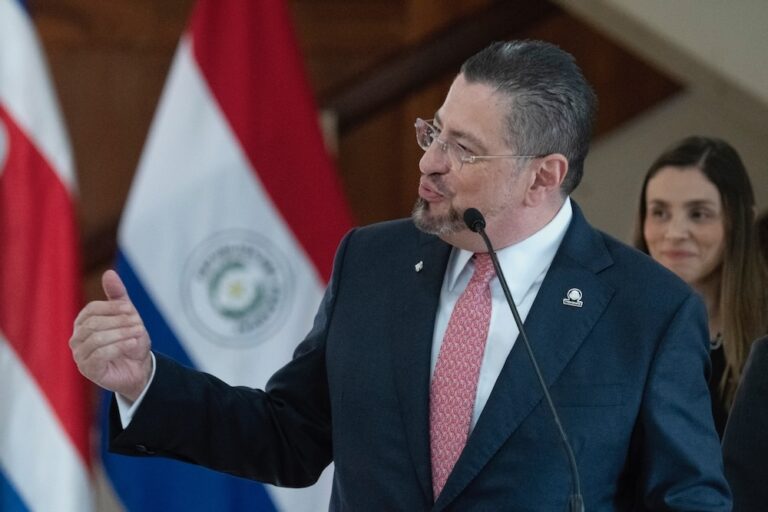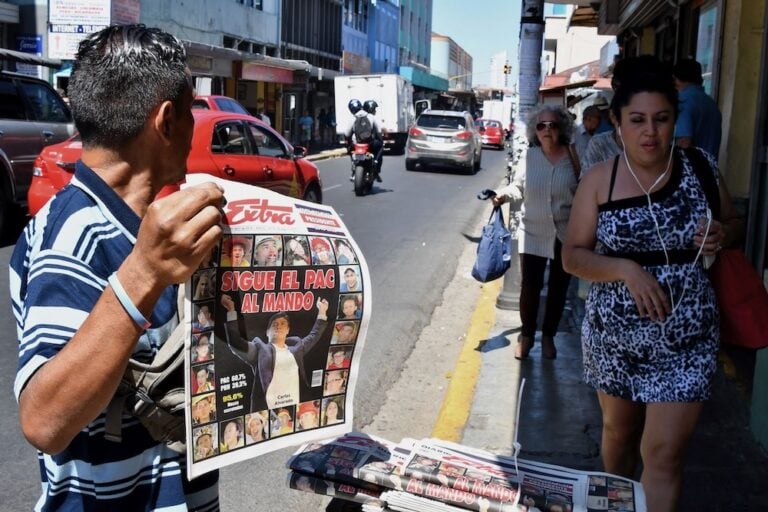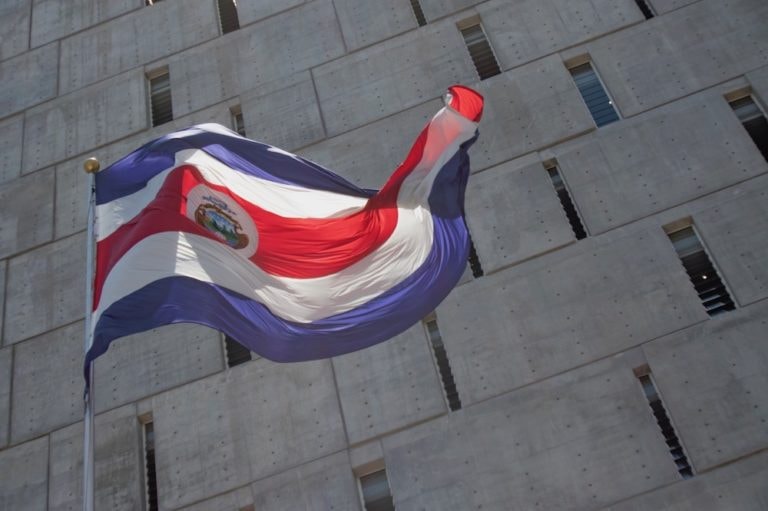(WPFC/IFEX) – The following is a 19 April 2001 WPFC press release, followed by a letter addressed to Costa Rican President Miguel Angel Rodríguez: Reston, Va. (19 April 2001) – The World Press Freedom Committee today commended Costa Rican President Miguel Angel Rodriguez for submitting a bill to Costa Rica’s Legislative Assembly to eliminate the […]
(WPFC/IFEX) – The following is a 19 April 2001 WPFC press release, followed by a letter addressed to Costa Rican President Miguel Angel Rodríguez:
Reston, Va. (19 April 2001) – The World Press Freedom Committee today commended Costa Rican President Miguel Angel Rodriguez for submitting a bill to Costa Rica’s Legislative Assembly to eliminate the offense of “insult” or desacato, and for proposing reform of other criminal laws used to restrict freedom of the press.
Costa Rica’s desacato law, part of the nation’s Criminal Code and a legacy of Costa Rica’s old colonial period, improperly shields public officials from scrutiny and criticism by citizens and the press.
“Elimination of Article 307 of the Criminal Code and reform of Costa Rica’s laws on crimes against a person’s ‘honor,’ would represent a valuable precedent to be imitated by all Latin American nations,” WPFC Chairman James H. Ottaway, Jr. said in a letter to President Rodriguez.
“By demonstrating this leadership, Costa Rica has another opportunity to show that it is the leader toward full democracy in Latin America,” Ottaway said.
In January, Ottaway led a WPFC delegation to Costa Rica, personally urging President Rodriguez as well as legislators and judges to bring Costa Rica’s laws in line with principles of press freedom laid out by the Inter-American Commission on Human Rights. The Commission has recommended elimination of desacato laws, as well as the decriminalization of libel, slander and defamation laws.
Legislative leaders have expressed support for such reforms, which have been slowed by resistance in Costa Rica’s judicial branch. A quarter-million dollar judgment handed down by the Supreme Court against Costa Rica’s leading daily newspaper, La Nacion, is pending before the Inter-American Commission on Human Rights in Washington.
The World Press Freedom Committee has prepared a friend-of-the court statement in support of the newspaper and its director, Eduardo Ulibarri, a former president of the Inter American Press Association.
At issue is the question of whether the newspaper should be held liable for reports it obtained from European newspapers about a Costa Rican diplomat’s alleged misdeeds. Press freedom advocates say that upholding the judgment against La Nacion would have a chilling effect on all Costa Rican media, which might hesitate to publish wire reports for fear of heavy fines and lawsuits.
In eliminating its desacato law, Costa Rica would be the second Latin American country to do so since the Inter-American Commission’s recommendation in 1994. Paraguay repealed its desacato law in 1998; Argentina eliminated its law a year prior to the Commission’s recommendation. Eighteen other Latin American nations continue to maintain insult or desacato laws, as do many countries elsewhere.
In his letter to Rodriguez, Ottaway pledged WPFC’s ongoing support for reforms in Costa Rica. “We will continue to monitor the advance of these legal actions in Costa Rica and offer you any encouragement and assistance possible toward the successful achievement of these goals,” he said.
The World Press Freedom Committee, with headquarters in Reston, Va., is a global coordination group that includes 44 free-press organizations on six continents. The WPFC is dedicated to a full and free flow of news everywhere.
19 April 2001
Dr. Miguel Angel Rodríguez
Presidente de la República de Costa Rica
CASA PRESIDENCIAL
Apartado 520 (2010)
Zapote, San José, Costa Rica
Dear President Rodriguez,
On behalf of the World Press Freedom Committee (WPFC), I wish to congratulate you for your decision to submit to the Costa Rican Legislative Assembly bill No. 14.311 eliminating the crime of “desacato,” established in Article 307 of the Criminal Code.
The desacato law, an unfortunate legacy of colonial times and of an authoritarian era left behind by the vast majority of Latin American countries, provides unwarranted protection for public officials against the scrutiny of the people they are committed to serve. This privilege seriously compromises a society’s ability to demand accountability from its public servants, and denies citizens their fundamental right to seek and receive information, to question and criticize public officials.
We also wish to acknowledge your renewed attempts to reform the laws that regulate so-called crimes against a person’s “honor,” through bill No. 13.473. We urge you to take an even more determined step, by promoting elimination of defamation, calumny and insult as criminal offenses. We further urge elimination of the crime of publication of offenses, as far as they are related to reports and criticism of the performance of public officials.
Likewise, we urge you to promote the elimination of the virtual presumption of guilt for a journalist from the Costa Rican laws. In your country, the burden of proof rests inappropriately on the journalist or news media, rather than, as it should, on the plaintiff.
The use of these laws regulating the crimes against a person’s “honor” results in severe restrictions on Costa Rican citizens’ rights to freedom of expression and of the press, and the free flow of information.
Elimination of Article 307 of the Criminal Code and reform of Costa Rica’s laws on crimes against a person’s “honor” would represent a valuable precedent to be imitated by all Latin American nations. By showing this leadership, Costa Rica has another opportunity to show that it is the leader toward full democracy in Latin America.
We will continue to monitor the advance of these legal actions in Costa Rica and offer you any encouragement and assistance possible toward the successful achievement of these goals. Please let us know if we can help you.
Sincerely,
James H. Ottaway, Jr.
Chairman
World Press Freedom Committee
cc: Dra. Rina Contreras
Dra. Sonia Picado
Ing. Roberto Rojas
For further information, contact Marilyn J. Greene at the WPFC


